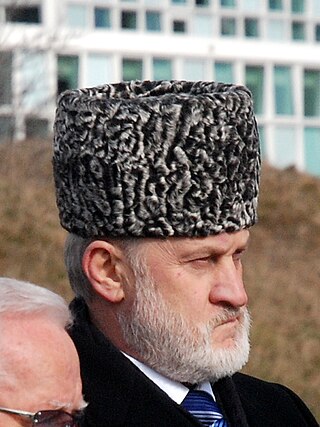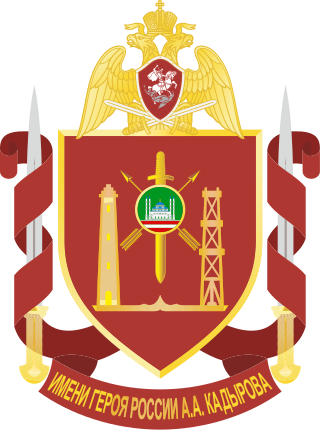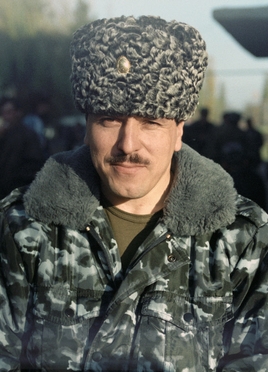Related Research Articles

Akhmed Halidovich Zakayev is a Chechen statesman, political and military figure of the unrecognised Chechen Republic of Ichkeria (ChRI). Having previously been a Deputy Prime Minister, he now serves as Prime Minister of the ChRI government-in-exile. He was also the Foreign Minister of the Ichkerian government, appointed by Aslan Maskhadov shortly after his 1997 election, and again in 2006 by Abdul Halim Sadulayev. An active participant in the Russian-Chechen wars, Zakayev took part in the battles for Grozny and the defense of Goyskoye, along with other military operations, as well as in high-level negotiations with the Russian side.

Ramzan Akhmatovich Kadyrov is a Russian politician and current Head of the Chechen Republic. He was formerly affiliated with the Chechen independence movement, through his father who was the separatist-appointed mufti of Chechnya. He is a colonel general in the Russian military.

OMON is a system of Military special police units within the Armed Forces of Russia. It previously operated within the structures of the Soviet and Russian Ministries of Internal Affairs (MVD). Originating as the special forces unit of the Soviet Militsiya in 1988, it has played major roles in several armed conflicts during and following the 1991 dissolution of the Soviet Union.

On 19 August 2002, a group of Chechen fighters armed with a man-portable air-defense system brought down a Russian Mil Mi-26 helicopter in a minefield, which resulted in the death of 127 Russian soldiers in the greatest loss of life in the history of helicopter aviation. It is also the most deadly aviation disaster ever suffered by the Russian Armed Forces, as well as its worst loss of life in a single day since the 1999 start of the Second Chechen War.

The Chechen Republic of Ichkeria, known simply as Ichkeria, and also known as Chechnya, was a de facto state that controlled most of the former Checheno-Ingush ASSR from 1991 to 2000 and has been a government-in-exile since.

The 141st Special Motorized Regiment, also known as the Kadyrovites and the Akhmat special forces unit, is a paramilitary organization in Chechnya, Russia, that serves as the protection of the Head of the Chechen Republic. The term Kadyrovtsy is commonly used in Chechnya to refer to any armed, ethnically-Chechen men under the control of Head of the Chechen Republic Ramzan Kadyrov, although nominally they are under the umbrella of the National Guard of Russia. As of 2023, the regiment's official commander was Adam Delimkhanov, a close ally of Kadyrov.

The 1999–2000 battle of Grozny was the siege and assault of the Chechen capital Grozny by Russian forces, lasting from late 1999 to early 2000. This siege and assault of the Chechen capital resulted in the widespread devastation of Grozny. In 2003, the United Nations designated Grozny as the most destroyed city on Earth due to the extensive damage it suffered. The battle had a devastating impact on the civilian population. It is estimated that between 5,000 and 8,000 civilians were killed during the siege, making it the bloodiest episode of the Second Chechen War.

In Chechnya, mass graves containing hundreds of corpses have been uncovered since the beginning of the Chechen wars in 1994. As of June 2008, there were 57 registered locations of mass graves in Chechnya. According to Amnesty International, thousands may be buried in unmarked graves including up to 5,000 civilians who disappeared since the beginning of the Second Chechen War in 1999. In 2008, the largest mass grave found to date was uncovered in Grozny, containing some 800 bodies from the First Chechen War in 1995. Russia's general policy to the Chechen mass graves is to not exhume them.
Human rights violations were committed by the warring sides during the second war in Chechnya. Both Russian officials and Chechen rebels have been regularly and repeatedly accused of committing war crimes including kidnapping, torture, murder, hostage taking, looting, rape, decapitation, and assorted other breaches of the law of war. International and humanitarian organizations, including the Council of Europe and Amnesty International, have criticized both sides of the conflict for blatant and sustained violations of international humanitarian law.
In June 2000, the North Caucasian Chechen separatist-led Chechen insurgents added suicide bombing to their tactics in their struggle against Russia. Since then, there have been dozens of suicide attacks within and outside the republic of Chechnya, resulting in thousands of casualties among Russian security personnel and civilians. The profiles of the suicide bombers have varied, as have the circumstances surrounding the bombings.
Sergei (Sergey) Lapin, also known by his radio communications call sign Kadet ("Cadet"), is a former Russian police officer who had served in Grozny, Chechnya as a Lieutenant in the OMON from the Khanty–Mansi Autonomous Okrug. He has been convicted for the torture and "disappearance" of a Chechen student.
The Novye Aldi massacre was the mass murder of Chechen civilians on February 5, 2000, in which Russian forces went on a cleansing operation (zachistka) summarily executing dozens of civilians. The village had been cluster-bombed a day prior to the massacre, and local residents urged to come out for inspection the next day. Upon entering the village, Russian forces shot their victims in cold blood, with automatic fire at close range. The killings were accompanied by looting, rape, arson and robbery. As a result of the deadly rampage by Russian forces, up to 82 civilians were killed in the spree. Houses of civilians were burnt in an attempt to destroy evidence of summary executions and other crimes. Looting took place on a large scale and organised manner.

The 2000 Zhani-Vedeno ambush took place on March 29, 2000, when a mechanized column of Russian Military Police troops was ambushed in the southern Vedensky District of Chechnya. As the result of the attack on the convoy and on Russian relief forces, scores of Russian special police and paramilitary troops were killed or captured. 40 OMON officers in the column and six in a relief column were killed and 11 more were taken hostage, 9 of whom were executed soon after Russian command refused to swap them for the arrested chechen commander Yuri Budanov.
The Grozny OMON friendly fire incident took place on March 2, 2000, when an OMON unit from Podolsk, supported by paramilitary police from the Sverdlovsk Oblast in armored vehicles, opened friendly fire on a motorized column of OMON from Sergiyev Posad, which had just arrived in Chechnya to replace them.
The 2002 Grozny OMON ambush occurred on April 18, 2002, when Chechen insurgents killed about 8 and wounded two republican OMON special police officers.

Vakha Khamidovich Arsanov was a Chechen divisional general and politician who was Vice President of Ichkeria from 1997 to 2001.
The Borozdinovskaya operation was a zachistka-type operation by Russian forces in Borozdinovskaya, Chechnya, on June 4, 2005, during the Second Chechen War. Members of the Special Battalion Vostok, an ethnic Chechen Spetsnaz unit of the Russian GRU, killed or disappeared 12 people in the ethnic minority Avar village of Borozdinovskaya, near the border with the Dagestan. Representatives of the Russian federal authorities expressed outrage over the incident, and the commander of the unit responsible was convicted.

Zelimkhan Murdalov was a student from Grozny, Chechnya, who left his home on 2 January 2001, saying he would return but never did. His parents tracked him down at the police station, where an official promised that he would soon be released, but they have not seen their son since. According to witnesses, Murdalov was subsequently severely tortured while in police custody. His case was first brought to the public prominence by the September 2001 Novaya Gazeta article "The Disappearance" by Anna Politkovskaya.
References
- ↑ Human rights violations in the Chechen Republic: the Committee of Ministers’ responsibility vis-à-vis the Assembly’s concerns Archived 2008-06-20 at the Wayback Machine , Council of Europe, 21 December 2005
- ↑ Protest in Favor of Wanted OMON Officer, The St. Petersburg Times , May 31, 2005
- ↑ An Unlikely Antiwar Hero for Russians, Los Angeles Times , July 03, 2005